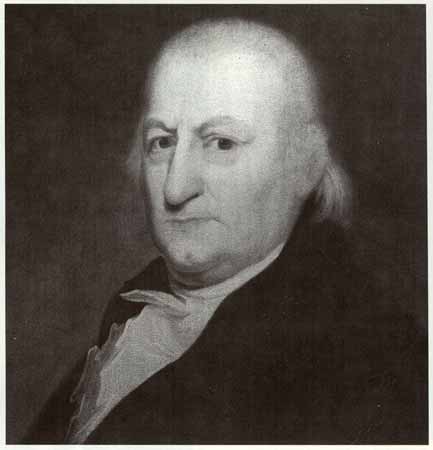Aaron Levy (1742-1815) was a Jewish immigrant who arrived in America from the Netherlands and donated land for a church and school in the Centre County village that became Aaronsburg in 1786. The goodwill behind the donation of the land to the group of German Christian immigrants who settled the community, along with a gift of pewter communion vessels for their church, came to symbolize tolerance and fellowship among neighbors in Aaronsburg.

In October 1949, Aaronsburg received national attention through what became known as “The Aaronsburg Story,” a historical pageant commemorating Levy’s gifts and the meaning they held for the town. More than 30,000 people gathered in the community of 312 residents to promote racial and religious tolerance, and reaffirm the legacy of Levy’s generosity.
When Levy arrived in America from Amsterdam, he settled in Northumberland, Pennsylvania. During the Revolutionary War, he supported the Colonial army with money and supplies, and served with the Northumberland Militia. He worked frequently with Robert Morris, another financier of the war. After the war, he speculated in land across Pennsylvania and became one of the largest land owners in the state.
In 1797, Levy bought 334 acres in what became Centre County, intending to develop the area that became Aaronsburg into the county seat. A plan for the town of Aaronsburg was recorded on October 4, 1786. Levy planned 612 lots and a wide main thoroughfare. The Jewish Encyclopedia notes that Aaronsburg was the first town in the United States to be planned by and named after a Jewish person.
Soon homes were built along the thoroughfare. In 1790, the first store in Aaronsburg opened and in 1797 the first post office in the area was established. Levy encouraged German immigrant farmers to move to the rich farmland and open spaces of the Penns Valley. Many moved to the area, but the population of Aaronsburg did not grow to the size that Levy had hoped.
Levy realized that his dream of a large town that could become the county seat was not going to materialize. At the same time, his overall finances began to suffer. He changed his plans and moved to Philadelphia, selling most of his remaining Pennsylvania acreage to members of the Philadelphia-based Gratz family.
He lived quietly in Philadelphia with his wife, Rachel Levy, until his death in 1815 at the age of 73.
Sally Heffentreyer
Sources:
“Levy, Aaron.” Jewish Encyclopedia. https://jewishencyclopedia.com/articles/9869-levy-aaron (Accessed May 27, 2021).
Fish, Sidney Meshulam. “Aaron Levy, Founder of Aaronsburg,” Studies in American Jewish History No. 1. New York, NY: American Jewish Historical Society, 1951.
Lewis, Arthur H. The Aaronsburg Story. New York: Vanguard Press, 1955.
First Published: June 11, 2021
Last Modified: September 29, 2021
